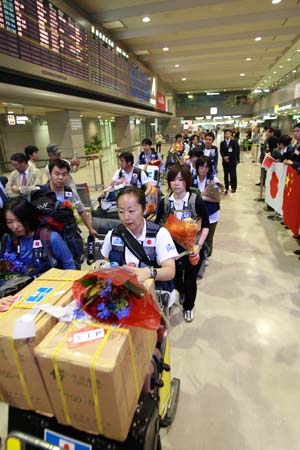Rescue teams from Russia, South Korea and Singapore soon followed suit, travelling to Mianzhu, Dujiangyan and Shifang – the areas hit worst by the earthquake.
Some of the work was painful to witness, according to Li.
In one instance, the Japanese rescuers cleared crushed stones by hand to protect the remains of a mother and daughter. The rescuers were moved to tears at the sight of the mother, who tried to save her daughter by using her own body as a shield.

Members of Japanese medical team arrive at the Narita airport in Chiba Prefecture, Japan, June 2, 2008. A 23-member Japanese medical team returned to Japan from the quake-hit southwest China's Sichuan Province on Monday. The team cured a total of 1,355 patients since May 20 when they arrived in Chengdu, the capital of Sichuan Province.
Chinese and foreign rescuers worked together closely during the relief campaign, using detectors to find survivors after the tragedy.
Li quoted the leader of the Japanese team as saying "I feel honored to participate in this disaster relief and it is meaningful. We have developed fraternal ties with the PLA soldiers during our cooperation."
Russian rescuers burst into tears when the trapped being pulled out
A 61-year-old woman was rescued 127 hours after the May 12 earthquake. It took the Russian rescuers only slightly more than ten minutes to pull out the woman after they learned she was conscious.